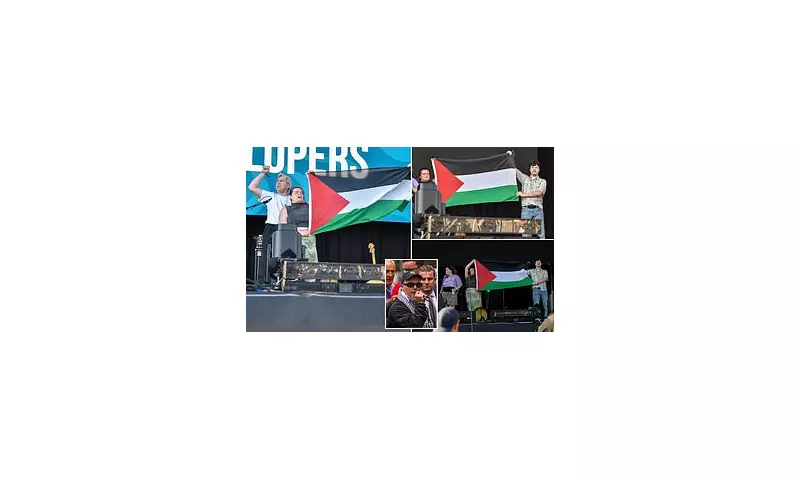
In a bold act of political defiance that has set the UK music scene abuzz, Irish rap provocateurs Kneecap deliberately flouted festival organisers' directives by unveiling a large pro-Palestine flag during their headline performance at England's Shambala Festival.
The Belfast-based trio, performing on the final night of the Northamptonshire event, executed their controversial display despite clear instructions from organisers prohibiting such political statements. The incident has sparked intense debate about the intersection of music, politics, and artistic freedom at UK festivals.
Defiance On Stage
Eyewitnesses report that Kneecap members orchestrated the flag display with precision timing during their set. A supporter strategically positioned the flag at the front of the stage, creating a powerful visual statement that immediately captured audience attention and divided reactions throughout the venue.
Festival management had previously communicated to all performers that overt political symbols, particularly those related to the highly charged Israel-Palestine conflict, were expressly forbidden during performances. This policy was implemented to maintain what organisers described as a "safe and inclusive atmosphere" for all attendees.
Mixed Reactions From Audience
The provocative act generated immediate and polarized responses from festival-goers. While some audience members cheered and applauded the display, viewing it as a legitimate expression of political solidarity, others reportedly expressed discomfort and frustration at what they perceived as the politicization of their musical experience.
Several attendees voiced concerns that the festival environment should remain a space free from complex international political conflicts, while supporters argued that artistic expression inherently includes political commentary and should not be censored.
Kneecap's History of Provocation
This incident aligns with Kneecap's established reputation for controversy and political engagement. The Irish-language rap group has consistently incorporated strong political messaging into their music and performances, frequently addressing issues related to Irish identity, republicanism, and international solidarity movements.
The group's music, performed primarily in Irish Gaelic, has gained them both critical acclaim and notoriety, positioning them as one of the most politically outspoken acts in contemporary Irish music. Their latest action at Shambala Festival represents an extension of their commitment to using their platform for political expression, regardless of venue restrictions.
Festival Organisers' Response
Shambala Festival organisers have maintained their position that while they respect artistic freedom, they believe festivals should primarily serve as spaces of celebration and escape from political tensions. The management emphasized their responsibility to create an environment where all attendees feel comfortable, regardless of their political views.
This incident has reignited ongoing debates within the UK music industry about the role of festivals in either accommodating or restricting political expression, and where the line should be drawn between artistic freedom and creating inclusive public spaces.
The controversy comes at a time when numerous music festivals across Britain are grappling with how to handle increasingly politicized performances and the growing expectation from artists and audiences alike that entertainment venues will take stands on international issues.





